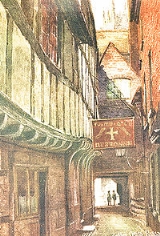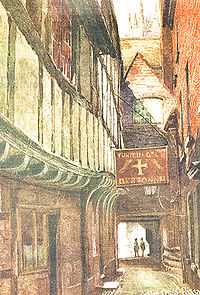
Golden Cross, Shrewsbury
Encyclopedia
The Golden Cross is a public house
in Shrewsbury
, England
; it is reputed to be the oldest licensed Public House in Shrewsbury and records show that it was used as an inn as far back as 1428, some years before the introduction of formal licensing.
Its original name was the Sextry, so called because it was originally the sacristy
of Old St. Chad's Church (the ruins of which can still be seen over the road in Princes Street).
 The Sacristy was where the church plate and vestments were kept, and it also provided lodgings for a church officer known as the Sacristan. Similarly, the original name of Golden Cross Passage was Sextry Shut, and here were the lodgings of the Vicar's Choral of St. Chad's. In 1933 a couple of timber framed archways were discovered which a local archaeologist dated back to the time of Henry III (1216–1272), but these had apparently been covered by a later building which some unknown authority has assigned to 1428.
The Sacristy was where the church plate and vestments were kept, and it also provided lodgings for a church officer known as the Sacristan. Similarly, the original name of Golden Cross Passage was Sextry Shut, and here were the lodgings of the Vicar's Choral of St. Chad's. In 1933 a couple of timber framed archways were discovered which a local archaeologist dated back to the time of Henry III (1216–1272), but these had apparently been covered by a later building which some unknown authority has assigned to 1428.
The Sacristy was connected to the church by a covered passageway, probably to provide shelter for the Vicars Choral as they processed to their midnight offices in the church. The passageway was subsequently demolished, and the present Princess Street now cuts across its path. Although alterations have occurred over the years, much of the building dates back to the last quarter of the fifteenth century.
The earliest surviving record for the inn is a Bailiffs' Account for 1495, which shows that the sum of 13s.2d (66p in modern currency) was spent on 'The King's gentlemen in sextre at the comyng home of Mr Prynce from London'. It is not certain who the important 'Mr Prynce' was, but there may be a connection between him and the name 'Princess Street', as earlier spellings of the name show it as 'Princes Street'.
The first known licensee of the inn appears in 1619, when the Bailiffs' Account mentions a lawsuit between John Cleve of the Sextry and his father-in-law John Price of the Pheasant in Mardol (another part of Shrewsbury town centre).
During the Civil War a group of Royalists from the town regularly met there and were described by one of their number as " a club of good fellowship," while a member of the opposite persuasion referred to them as "a knot of company seekers."
The inn was first recorded as The Golden Cross in 1780 and it has been a popular meeting place throughout its history. In the 19th century the landlord was Thomas Harris and he was particularly proud of his dinners provided daily "for those who wished to be served at his house or at their own houses." Perhaps the town's first take-a-way service! He also sold fresh poultry ready for dressing and prime sausages in season.
1796 William Hill, corrupt tory politician bought votes from the local freemen by plying them liberally with food and drink at the Golden Cross Tavern, before bankruptcy forced him into hanging himself.
In 1900 the inn was owned by Worthington & Co. and had six private and four public rooms. The landlady at this time was Maria Seddon who later changed her name to Banning. She was obliged to sell the brewery's beer and stout but could supply her own spirits.
Public house
A public house, informally known as a pub, is a drinking establishment fundamental to the culture of Britain, Ireland, Australia and New Zealand. There are approximately 53,500 public houses in the United Kingdom. This number has been declining every year, so that nearly half of the smaller...
in Shrewsbury
Shrewsbury
Shrewsbury is the county town of Shropshire, in the West Midlands region of England. Lying on the River Severn, it is a civil parish home to some 70,000 inhabitants, and is the primary settlement and headquarters of Shropshire Council...
, England
England
England is a country that is part of the United Kingdom. It shares land borders with Scotland to the north and Wales to the west; the Irish Sea is to the north west, the Celtic Sea to the south west, with the North Sea to the east and the English Channel to the south separating it from continental...
; it is reputed to be the oldest licensed Public House in Shrewsbury and records show that it was used as an inn as far back as 1428, some years before the introduction of formal licensing.
Its original name was the Sextry, so called because it was originally the sacristy
Sacristy
A sacristy is a room for keeping vestments and other church furnishings, sacred vessels, and parish records.The sacristy is usually located inside the church, but in some cases it is an annex or separate building...
of Old St. Chad's Church (the ruins of which can still be seen over the road in Princes Street).

The Sacristy was connected to the church by a covered passageway, probably to provide shelter for the Vicars Choral as they processed to their midnight offices in the church. The passageway was subsequently demolished, and the present Princess Street now cuts across its path. Although alterations have occurred over the years, much of the building dates back to the last quarter of the fifteenth century.
The earliest surviving record for the inn is a Bailiffs' Account for 1495, which shows that the sum of 13s.2d (66p in modern currency) was spent on 'The King's gentlemen in sextre at the comyng home of Mr Prynce from London'. It is not certain who the important 'Mr Prynce' was, but there may be a connection between him and the name 'Princess Street', as earlier spellings of the name show it as 'Princes Street'.
The first known licensee of the inn appears in 1619, when the Bailiffs' Account mentions a lawsuit between John Cleve of the Sextry and his father-in-law John Price of the Pheasant in Mardol (another part of Shrewsbury town centre).
During the Civil War a group of Royalists from the town regularly met there and were described by one of their number as " a club of good fellowship," while a member of the opposite persuasion referred to them as "a knot of company seekers."
The inn was first recorded as The Golden Cross in 1780 and it has been a popular meeting place throughout its history. In the 19th century the landlord was Thomas Harris and he was particularly proud of his dinners provided daily "for those who wished to be served at his house or at their own houses." Perhaps the town's first take-a-way service! He also sold fresh poultry ready for dressing and prime sausages in season.
1796 William Hill, corrupt tory politician bought votes from the local freemen by plying them liberally with food and drink at the Golden Cross Tavern, before bankruptcy forced him into hanging himself.
In 1900 the inn was owned by Worthington & Co. and had six private and four public rooms. The landlady at this time was Maria Seddon who later changed her name to Banning. She was obliged to sell the brewery's beer and stout but could supply her own spirits.
External links
- Golden Cross Hotel — hotel guide
- Golden Cross Hotel — official website

